RSS
Terror Leaders & Operatives: More Details on the Palestinian Prisoners That Have Been Set Free

Supporters and family members of hostages kidnapped during the deadly Oct. 7, 2023, attack on Israel by Hamas, hold lit torches during a protest ahead of a ceasefire between Israel and Hamas, in Tel Aviv, Israel, Jan. 16, 2025. Photo: REUTERS/Shir Torem
As part of the ceasefire deal between Israel and Hamas, hundreds of Palestinian prisoners are set to be released from Israeli prisons in exchange for the remaining Israeli hostages held by Hamas and other Palestinian terror groups in Gaza.
Alongside the over 1,000 Gazans who were detained by the Israeli military during the current war between Israel and Hamas, the Israeli government released a list of over 700 imprisoned Palestinians who will potentially be released as part of this deal.
While the media may focus on those who are imprisoned under the system of administrative detention or the women and teens on the list, it is clear from the information provided by the Israeli government that the vast majority of those slated for release are men with ties to internationally-designated terror groups, some of whom have blood on their hands and are serving long prison sentences.
The following is a breakdown of the 733 Palestinian prisoners listed by the Israeli government according to gender, age, charges, imprisonment status, terror affiliation, and whether they will be exiled to a third country:
Breakdown of Prisoners by Gender
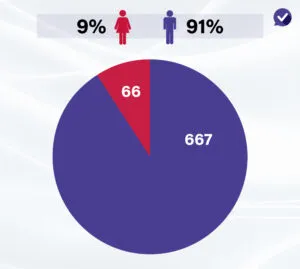
Breakdown of Prisoners by Age
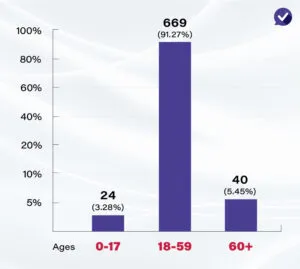
Breakdown of Prisoners by Charges
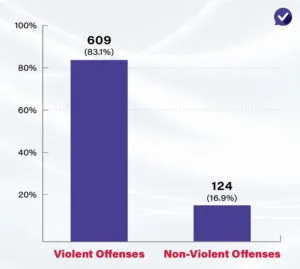
Violent offenses include murder, attempted murder, possession of weapons, kidnapping, rock-throwing, shooting, production of weapons, and assault.
Non-violent offenses include membership in a terror org, incitement, and breach of probation.
Sentenced Prisoners v Detainees
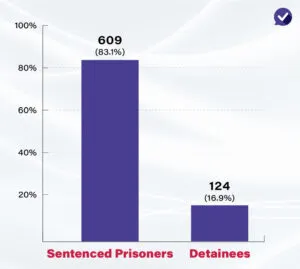
Breakdown of Prisoners by Terror Affiliation
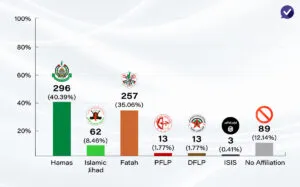
Fatah includes Al-Aqsa Martyrs Brigades
Prisoners Remaining in Region v Prisoners Being Exiled to a Third Country
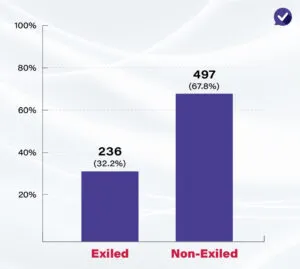
Who Are the Most Dangerous Prisoners on the List?
Among the 733 Palestinian prisoners slated to be released as part of the ceasefire deal are many with Israeli blood on their hands, including terrorist leaders and masterminds.
The following are just some of the most dangerous Palestinian terrorists set to be let go in the coming weeks:
Zakaria Zubeidi
- Served as chief of the Fatah-aligned Al-Aqsa Martyrs Brigades in Jenin during the Second Intifada.
- Was involved in several terror attacks, including the 2002 bombing of Likud headquarters in Beit Shean, which killed six Israelis.
- Was given amnesty by Israel in 2007 in return for renouncing violence.
- Arrested in 2019 for shooting at two Israeli civilian buses in the West Bank.
- Took part in the 2021 breakout from Gilboa Prison. Was re-arrested a few days later.
Tabat Mardawi
- Senior Islamic Jihad leader from Jenin.
- Responsible for several bombings and shootings during the Second Intifada, including the suicide bombing of Bus #83 in Afula and the suicide attacks on the Binyamina and Hadera central bus stations.
- Serving 21 life sentences and an additional 40 years in prison for his role in the murder of 21 Israelis and the wounding of 190 more.
Ahmed Barghouti
- Senior aide and cousin of notorious Palestinian terrorist and prisoner Marwan Barghouti.
- Served as the head of Al-Aqsa Martyrs Brigades in Ramallah.
- Orchestrated several bombing and shooting attacks during the Second Intifada, including a shooting spree on Jaffa Street in Jerusalem, a suicide attack at the Maccabim checkpoint, and a shooting attack at a Tel Aviv seafood restaurant.
- Serving 13 life sentences for his role in the murder of 12 Israeli civilians.
Mohammad Abu Warda
- Member of Hamas.
- Serving 48 life sentences for orchestrating the 1996 suicide bombing attacks on the number 18 bus line in Jerusalem, which killed 45 people.
- Described by the military prosecutor as “a mass murderer standing before the court today.”
Mohammed Naifeh
- Member of Al-Aqsa Martyrs Brigades.
- Serving 13 life sentences for dispatching the terrorists in the 2002 attacks on Kibbutz Metzer and Hermesh, which killed 8 Israelis (including a 34-year-old woman and her two infant children).
- In 2018, was accused of attempting to orchestrate a terror attack from prison.
- Considered to be one of the “most senior Palestinian prisoners in Israel.”
The Silwan Squad
- Three members (Wael Qassem, Wissam Abasi, and Muhammad Odeh) of the four-person Hamas cell are slated to be released.
- Orchestrated five terror attacks between March and June 2022, including the suicide attacks on Café Moment in Jerusalem, the Sheffield Club in Rishon Letzion, and Hebrew University in Jerusalem.
- Serving multiple life sentences for the murder of 35 people (including four Americans) and the wounding of hundreds more.
Mahmoud Attallah
- Member of Fatah.
- Serving one life sentence and 15 years for the 2003 murder of a Palestinian woman suspected of collaborating with Israeli security forces.
- Accused of the rape and sexual abuse of female Israeli prison guards while incarcerated at Gilboa Prison.
Mahmoud Atallah-
Murdered a Palestinian woman because she was suspected of collaborating with Israel
Accused of rape and sexual harassment of 6 female guards pic.twitter.com/yyhPETxXCr— Adin – عدین – עדין (@AdinHaykin1) January 18, 2025
Ahmad Obeid
- Head of Hamas terror cell in Jerusalem.
- Dispatched the suicide bomber who blew up Café Hillel in Jerusalem, killing seven people and wounding 64 more.
- Serving 7 life sentences.
Sami Jaradat
- Islamic Jihad operative from Jenin.
- Dispatched the suicide bomber (who happened to be his close relative) who blew up Maxim Restaurant in Haifa, killing 21 people and wounding 60 more.
- Serving 21 life sentences and 50 more years of imprisonment.
Abdullah Sharbati, Majdi Zaatari & Samer al-Atrash
- Members of a Hamas terror cell based in Jerusalem.
- Orchestrated the suicide bombing attacks on Jerusalem bus #2 (which killed 23 people, including 7 children), Jerusalem bus #14, and Jerusalem bus #6.
- Planned future terror attacks, including a suicide bombing of a banquet hall, the kidnapping of IDF soldiers, and the mass-poisoning of a Beit Shemesh delicatessen’s food supply.
The author is a contributor to HonestReporting, a Jerusalem-based media watchdog with a focus on antisemitism and anti-Israel bias — where a version of this article first appeared.
The post Terror Leaders & Operatives: More Details on the Palestinian Prisoners That Have Been Set Free first appeared on Algemeiner.com.
RSS
After False Dawns, Gazans Hope Trump Will Force End to Two-Year-Old War

Palestinians walk past a residential building destroyed in previous Israeli strikes, after Hamas agreed to release hostages and accept some other terms in a US plan to end the war, in Nuseirat, central Gaza Strip October 4, 2025. Photo: REUTERS/Mahmoud Issa
Exhausted Palestinians in Gaza clung to hopes on Saturday that US President Donald Trump would keep up pressure on Israel to end a two-year-old war that has killed tens of thousands and displaced the entire population of more than two million.
Hamas’ declaration that it was ready to hand over hostages and accept some terms of Trump’s plan to end the conflict while calling for more talks on several key issues was greeted with relief in the enclave, where most homes are now in ruins.
“It’s happy news, it saves those who are still alive,” said 32-year-old Saoud Qarneyta, reacting to Hamas’ response and Trump’s intervention. “This is enough. Houses have been damaged, everything has been damaged, what is left? Nothing.”
GAZAN RESIDENT HOPES ‘WE WILL BE DONE WITH WARS’
Ismail Zayda, 40, a father of three, displaced from a suburb in northern Gaza City where Israel launched a full-scale ground operation last month, said: “We want President Trump to keep pushing for an end to the war, if this chance is lost, it means that Gaza City will be destroyed by Israel and we might not survive.
“Enough, two years of bombardment, death and starvation. Enough,” he told Reuters on a social media chat.
“God willing this will be the last war. We will hopefully be done with the wars,” said 59-year-old Ali Ahmad, speaking in one of the tented camps where most Palestinians now live.
“We urge all sides not to backtrack. Every day of delay costs lives in Gaza, it is not just time wasted, lives get wasted too,” said Tamer Al-Burai, a Gaza City businessman displaced with members of his family in central Gaza Strip.
After two previous ceasefires — one near the start of the war and another earlier this year — lasted only a few weeks, he said; “I am very optimistic this time, maybe Trump’s seeking to be remembered as a man of peace, will bring us real peace this time.”
RESIDENT WORRIES THAT NETANYAHU WILL ‘SABOTAGE’ DEAL
Some voiced hopes of returning to their homes, but the Israeli military issued a fresh warning to Gazans on Saturday to stay out of Gaza City, describing it as a “dangerous combat zone.”
Gazans have faced previous false dawns during the past two years, when Trump and others declared at several points during on-off negotiations between Hamas, Israel and Arab and US mediators that a deal was close, only for war to rage on.
“Will it happen? Can we trust Trump? Maybe we trust Trump, but will Netanyahu abide this time? He has always sabotaged everything and continued the war. I hope he ends it now,” said Aya, 31, who was displaced with her family to Deir Al-Balah in the central Gaza Strip.
She added: “Maybe there is a chance the war ends at October 7, two years after it began.”
RSS
Mass Rally in Rome on Fourth Day of Italy’s Pro-Palestinian Protests

A Pro-Palestinian demonstrator waves a Palestinian flag during a national protest for Gaza in Rome, Italy, October 4, 2025. Photo: REUTERS/Claudia Greco
Large crowds assembled in central Rome on Saturday for the fourth straight day of protests in Italy since Israel intercepted an international flotilla trying to deliver aid to Gaza, and detained its activists.
People holding banners and Palestinian flags, chanting “Free Palestine” and other slogans, filed past the Colosseum, taking part in a march that organizers hoped would attract at least 1 million people.
“I’m here with a lot of other friends because I think it is important for us all to mobilize individually,” Francesco Galtieri, a 65-year-old musician from Rome, said. “If we don’t all mobilize, then nothing will change.”
Since Israel started blocking the flotilla late on Wednesday, protests have sprung up across Europe and in other parts of the world, but in Italy they have been a daily occurrence, in multiple cities.
On Friday, unions called a general strike in support of the flotilla, with demonstrations across the country that attracted more than 2 million, according to organizers. The interior ministry estimated attendance at around 400,000.
Italy’s right-wing government has been critical of the protests, with Prime Minister Giorgia Meloni suggesting that people would skip work for Gaza just as an excuse for a longer weekend break.
On Saturday, Meloni blamed protesters for insulting graffiti that appeared on a statue of the late Pope John Paul II outside Rome’s main train station, where Pro-Palestinian groups have been holding a protest picket.
“They say they are taking to the streets for peace, but then they insult the memory of a man who was a true defender and builder of peace. A shameful act committed by people blinded by ideology,” she said in a statement.
Israel launched its Gaza offensive after Hamas terrorists staged a cross border attack on October 7, 2023, killing some 1,200 people and taking 251 people hostage.
RSS
Hamas Says It Agrees to Release All Israeli Hostages Under Trump Gaza Plan

Smoke rises during an Israeli military operation in Gaza City, as seen from the central Gaza Strip, October 2, 2025. Photo: REUTERS/Dawoud Abu Alkas
Hamas said on Friday it had agreed to release all Israeli hostages, alive or dead, under the terms of US President Donald Trump’s Gaza proposal, and signaled readiness to immediately enter mediated negotiations to discuss the details.


